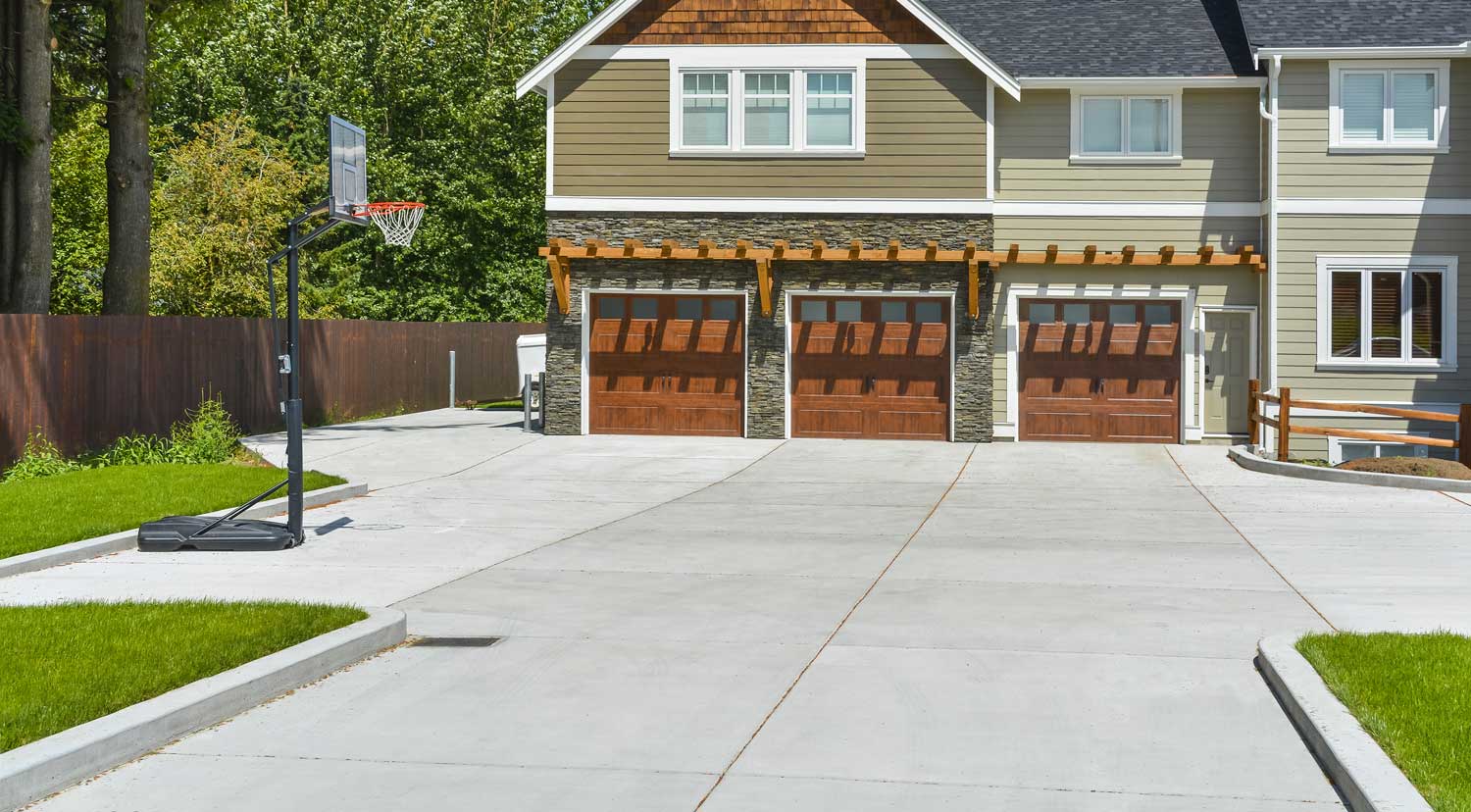Cost to Install Concrete Driveway – 2025 Price Calculator
Concrete driveways are a popular addition to many properties, particularly in the southern states. Concrete driveways are durable, attractive, and can be colored or stamped to give you decorative looks as well.
If you're thinking about having a concrete driveway installed on your property, one of the first things you will undoubtedly wonder is how much it costs to do so. The cost of the project may even determine the size of driveway you choose.
Concrete Driveway Cost Calculator
Enter the size of your project and select the material and services you're interested in to estimate the cost of the project using 2025 price data. Continue reading below to learn more about what to expect for a concrete driveway project.
On this page:
- How Much Does a Concrete Driveway Cost?
- How Many Cubic Yards Are Needed?
- The Average Driveway Cost Per Square Foot
- The Average Residential Driveway Size
- Concrete Driveway Material Costs
- Gravel Base
- Concrete Costs
- Reinforcement
- Forms
- Expansion Joints
- Concrete Driveway Labor Costs
- Driveway Price Factors
- Prep Work
- Thickness
- Stamping and Coloring
- Borders and Other Decorative Touches
- Demolition and Haul-away
- Calculate How Much Your Concrete Driveway Costs
- Frequently Asked Questions
- References
How Much Does a Concrete Driveway Cost?
A standard concrete driveway typically costs $3,200 to $11,500 on average. Colored or stamped driveways can cost significantly more than plain poured concrete, with simple concrete driveways costing $5 to $7 a square foot and decorative driveways costing $8 to $18 a square foot.
Several factors influence how much new concrete work will cost.

How Many Cubic Yards Are Needed?
To calculate the amount a concrete driveway will cost, you’ll need to know how much concrete you need. You should be aware that concrete is measured using cubic yards. Cubic yards are a way of measuring the volume of the concrete, so it utilizes three-dimensional measurements — literally what size the cube of concrete will be.
In other words, concrete is measured using the length and width of the area to be filled and then multiplied by the required depth of concrete required. The length multiplied by the width is what’s known as the square footage.
For driveways that will only be used for cars and small vehicles, a slab with a 4″ thickness is sufficient. However, to support the weight of larger vehicles and trucks, a thicker 5″ slab is recommended.[1]
Calculating the square footage can be done easily by inputting the length and width measurements into a square footage calculator.
The Average Driveway Cost Per Square Foot
If you hire a contractor who does a professional installation with a high-quality concrete mix, you can expect to pay $5 to $18 per square foot of concrete or more, depending on the specifics of your project.
But how do you know if the concrete is good quality? Well, the answer lies in the strength of the concrete. The strength of concrete is measured in pounds per square inch, or psi. A high-quality concrete mix for use on a driveway will have a compressive strength of 4,000 psi or more.[2]
This mix often costs more than a typical 2,000 psi mix but is necessary to support the increased weight of vehicles.
Before hiring any contractor, find out the strength of the concrete they mix. The strength determines its longevity and ability to retain its shape without cracking during even the harshest weather conditions. A low-grade concrete won’t last as long and will be more prone to cracking.
Installing a concrete driveway is a job any homeowner won’t want to have done more than once or twice during their lifetime, so it’s essential to ensure the concrete used is the best available.
The Average Residential Driveway Size
A single-car driveway should be between 9 and 12 feet wide, though a 9-foot wide drive can be quite narrow. A two-car driveway should be closer to 20 feet wide. Find the length by measuring from the entrance to the garage to the street.
Concrete Driveway Material Costs
When estimating a driveway project, be prepared to account for material for the base, concrete, reinforcement, forms, and expansion joints.
Gravel Base
In addition to concrete, a base of crushed stone will also be needed, which can cost $10 to $50 per ton on average. Use a gravel calculator to estimate how much you’ll need.
Concrete Costs
The cost of concrete varies by region, and the amount you’ll pay per cubic yard is different for every supplier. Some suppliers charge as low as $110 per cubic yard, while others may charge as high as $165 or more. Additives to the mix and delivery fees can increase the cost.
Reinforcement
To prevent cracking and add strength to the concrete, reinforcement will be needed. Most often, this will be a fiber or galvanized steel mesh, but on thicker pours, rebar may be used instead.
For a 4″ slab, a fiber or steel mesh is often used for reinforcement to prevent cracking and support the weight of vehicles. Mesh is a popular alternative to rebar since it’s much thinner, ensuring the concrete above and below the reinforcement is not too thin. This usually costs $1.00 – $1.50 per square foot for the material.
For thicker 5-6″ pours, rebar can be used for reinforcement. The amount of rebar needed will vary by the size of the driveway, size of the rebar, and chosen spacing. On average, rebar costs $2 to $3 per square foot installed. Use our rebar calculator to get a more precise estimate.
Forms
Some materials will also be needed to support the concrete pour, for example, forms and stakes. Prepare to spend at least $50 – $100 for lumber and material to create the forms.
Expansion Joints
Large concrete pours require expansion joints to be installed to prevent cracking as the slab expands and contracts over time. The materials can be as simple as a pressure-treated board costing only a couple bucks.
Most professionals also recommend adding a sealant to protect the expansion joint to prevent the accumulation of dirt and debris and to prevent weed growth in the joint.[3] Adding sealant will add about $2 – $3 per foot of joint for the sealant and backer rod.
Concrete Driveway Labor Costs
An experienced crew can prep and pour a new driveway at a pace of about 15-20 square feet per hour. Labor rates vary, but on average, labor costs run $40 to $55 per hour. Expect labor to make up roughly 40% of the total cost of the project.
Geographic location, experience of the crew, and size of the company can impact labor pricing.
Driveway Price Factors
There are a few significant factors that influence the price of a driveway installation, in addition to size, and labor and material costs.
Prep Work
The amount of prep work needed may result in adjustments to the price of the project. Uneven ground, rocky soil, or a steep slope take additional time to prepare than flat, soft topsoil.
Thickness
Increasing the thickness of the driveway to support the weight of heavier vehicles will increase the cost of the project. A thicker slab requires more excavation, reinforcement, and concrete, all of which contribute to a higher cost for a thicker slab.
Stamping and Coloring
Coloring and stamping concrete can significantly affect the price of the project. In some cases, adding a decorative touch can double the cost of the driveway installation. It takes quite a bit of time to do well and requires much more skill than a standard driveway pour.
However, it is possible to tint the concrete or add a simple finish for a lower cost. Using three or more colors and different decorative stamps will increase costs.
Borders and Other Decorative Touches
It may be obvious, but adding borders, edges, and other decorative touches will also increase the price of a driveway project. Some designs require multiple pours, which increases the costs substantially.
Demolition and Haul-away
There will likely be additional costs for demolition of an existing driveway. You might also need a dumpster, and you should definitely prepare to incur expenses for debris haul-away.
Calculate How Much Your Concrete Driveway Costs
Our concrete driveway calculator can help estimate the amount of material and material costs for your project. Even if you choose to hire a contractor for the job, you’ll be armed with rough material estimates and the information needed to ask intelligent questions before starting the project.
By inputting your specific measurements or even just drawing the driveway on the map, you can find an estimate of the cost of a concrete driveway.
Compare costs to those of a gravel driveway or an asphalt driveway.
Concrete driveways are a complex project, and hiring a professional for the installation is a natural choice. We suggest getting estimates from several contractors in your area to get a better idea of what your project might cost.
Frequently Asked Questions
Does a concrete driveway add value to your home?
A concrete driveway can improve your home’s curb appeal, making it look more attractive. This can improve the value of a home, as well as make it sell more quickly.
Is it worth reducing the thickness of the driveway to reduce the cost?
This will depend on several different factors, including how heavy the vehicles are that you will park there and where you are located. If you plan on parking heavy trucks or if you live in a cold climate, thinner concrete will not hold up and will crack and buckle quickly.
How long does a concrete driveway last?
Concrete driveways last about 20 to 30 years on average. They tend to last longer in warmer climates than colder climates, as colder climates may cause the concrete to crack.
All pricing information on this page is based on average industry costs, and is subject to variance for project-specific materials, labor rates, and requirements.
Similar Home Improvement Calculators
References
- Portland Cement Association, Driveways, https://www.cement.org/cement-concrete/paving/buildings-structures/concrete-homes/products/driveways
- ConcreteNetwork.com, The Correct Concrete Driveway Mix, https://www.concretenetwork.com/concrete/concrete_driveways/the_correct_concrete_mix.htm
- Sarah Etler, Filling Concrete Expansion Joints: What to Use and What to Avoid, A-1 Concrete Leveling, https://www.a1concrete.com/concrete-repair-learning-center/fill-concrete-expansion-joints


